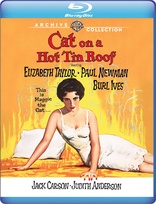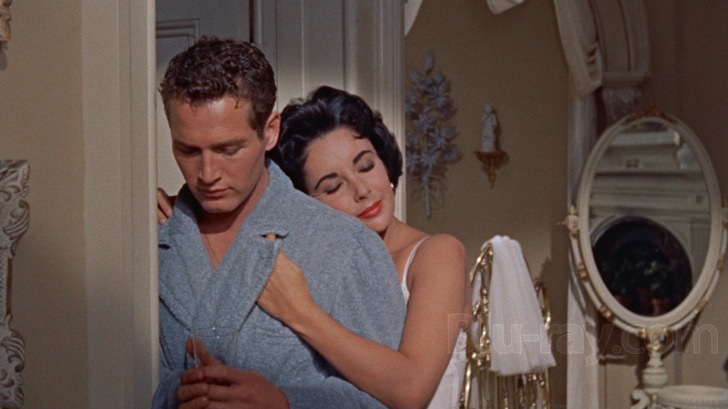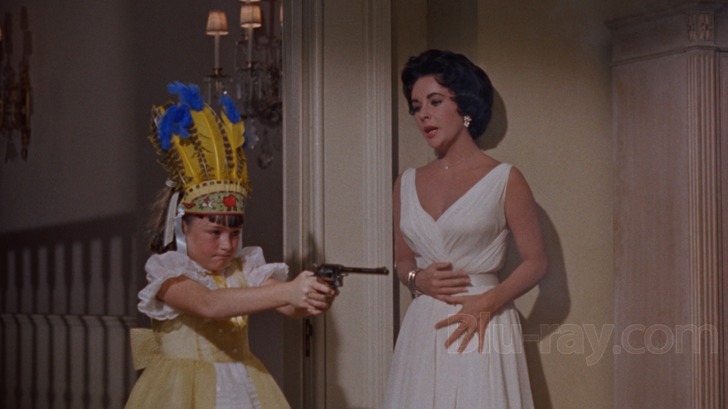Cat on a Hot Tin Roof Blu-ray Movie
HomeCat on a Hot Tin Roof Blu-ray Movie 
Warner Archive CollectionWarner Bros. | 1958 | 108 min | Not rated | Aug 09, 2016

Movie rating
7.9 | / 10 |
Blu-ray rating
| Users | 5.0 | |
| Reviewer | 4.0 | |
| Overall | 4.0 |
Overview
Cat on a Hot Tin Roof (1958)
Brick, an alcoholic ex-football player, drinks away his days away and resists the affections of his increasingly desperate wife, Maggie. A confrontation with his father, plantation owner Big Daddy, who is dying of cancer, jogs a host of memories and revelations for both father and son.
Starring: Elizabeth Taylor, Paul Newman, Burl Ives, Jack Carson, Judith AndersonDirector: Richard Brooks (I)
| Drama | 100% |
Specifications
Video
Video codec: MPEG-4 AVC
Video resolution: 1080p
Aspect ratio: 1.78:1
Original aspect ratio: 1.85:1
Audio
English: DTS-HD Master Audio 2.0 Mono (48kHz, 24-bit)
French: Dolby Digital 2.0 Mono
German: Dolby Digital 2.0 Mono
Spanish: Dolby Digital 2.0 Mono
Spanish: Dolby Digital 2.0 Mono
Czech: Dolby Digital 2.0 Mono
Polish: Dolby Digital 2.0 Mono
Spanish=Latin & Castillian
Subtitles
English SDH, French, German SDH, Japanese, Spanish, Czech, Korean, Polish, Romanian, Turkish
Discs
Blu-ray Disc
Single disc (1 BD)
Playback
Region A, B (C untested)
Review
Rating summary
| Movie | 3.5 | |
| Video | 4.5 | |
| Audio | 4.5 | |
| Extras | 3.0 | |
| Overall | 4.0 |
Cat on a Hot Tin Roof Blu-ray Movie Review
Williams Lite
Reviewed by Michael Reuben August 10, 2016Tennessee Williams' Cat on a Hot Tin Roof is one of the best plays by one of America's greatest
playwrights. Premiering on Broadway in 1955, it has since been repeatedly performed in both
professional and amateur theaters, with three Broadway revivals in this century alone. It has been
adapted for TV both here and in the U.K., and its signature roles are as coveted by actors as any
part in Shakespeare.
The 1958 film adaptation directed and co-written by Richard Brooks was a hit for MGM, but for some of the play's fans (not to mention the
playwright himself), it's a bittersweet experience. The film was lavishly mounted, handsomely shot and is graced by career-defining performances
from Elizabeth Taylor, who was already a screen idol, and Paul Newman, who cemented his movie star reputation with his searing portrayal of an
alcoholic ex-athlete disgusted with himself and the world. Burl Ives's incarnation of plantation
owner Big Daddy, the role he originated on Broadway, is still widely regarded as the definitive
interpretation against which all subsequent performances are measured.
But Brooks's film is not Williams' play. While the strictures of the Hays Code governing studio
productions required the elimination of crucial elements from Williams' multi-layered portrait of
a family in crisis, the industry censors aren't entirely to blame. At least some of the changes to Williams' plot
by Brooks and co-screenwriter James Poe (They Shoot
Horses, Don't They?) were made in
service of providing a crowd-pleasing happy ending, which is not what Williams wrote. As a
play, Cat exists in multiple versions, the history of which is a whole separate subject, but all of
them resolve with a bleak conclusion that was reversed for the screen. If you know Williams'
Cat, watching Brooks's film is an exercise in mentally filling in the blanks (and, occasionally,
overwriting the dialogue) with what Williams actually wrote. Thankfully, the performances are
so good that the playwright's original characters shine through their Hollywood makeover. If
Brooks had been allowed to film the original text, the result might have burned a hole in the
screen.
After extensive restoration work, the Warner Archive Collection is bringing Cat to Blu-ray in an
exemplary presentation.

Warning: A literary classic like Cat on a Hot Tin Roof should be no more "spoilable" than Shakespeare's Hamlet. Accordingly, the film's events are freely discussed below.
Cat is set on the sixty-fifth birthday of Mississippi cotton farmer Big Daddy Pollitt (Ives), a self-made man who has not yet been informed that he is dying of cancer. Indeed, after an extensive medical evaluation, Big Daddy has been told that he's fine, in a misguided effort to let him enjoy one last birthday. In Williams' original, this decision was made by family members, but Brooks's film transfers it to Big Daddy's doctor, in the first of many alterations designed to let the Pollitt family off the hook. Buoyed by the false report of a clean bill of health, Big Daddy has determined to reassert his control over a house riven by conflict, much of it over the disposition of the patriarch's sizeable estate between his two sons.
The elder son, Gooper (Jack Carson), is an attorney with an ambitious wife, Mae (Madeleine Sherwood), five children and another on the way. But while Gooper may be the responsible, respectable son, he isn't the favored one. That distinction belongs to his younger brother, Brick (Newman), a former football star who now drinks continuously and whose marriage to the beautiful Maggie (Taylor) is in shambles. Brick's refusal to sleep with Maggie has left her childless, thereby further endangering the inheritance that is already at risk from Brick's addiction to the bottle. Between Brick's sexual rejection and her fear of being left penniless (or worse, dependent on the good will of Gooper and Mae), Maggie is in a desperate state. She's the precarious "cat" of the title; she even refers to herself as "Maggie the Cat".
The marital conflict between Maggie and Brick is central to Cat, but it has been cleaned up and simplified for the screen. In the film, the crux of their dispute is Brick's belief that Maggie slept with his best friend and football colleague, Skipper, who then killed himself out of guilt. Eventually Maggie reveals that nothing happened between her and Skipper, which allows the pair a tentative reconciliation at the film's conclusion. In Williams' play, Brick's torment is far darker: a mixture of grief over the loss of his friend, anger over spousal betrayal and sexual confusion that may or may not point to repressed homosexuality—an ambiguity that Williams stressed was deliberate. More insidious was Maggie's suggestion of a sexual element to her husband's relationship with his friend, which prompted Skipper to sleep with her to prove otherwise—and in Williams' version, the infidelity actually happened, after which Skipper drank himself to death, as Brick is now doing. Williams' play allowed no reconciliation for the tortured couple, only a form of benevolent blackmail in which Maggie forces Brick to impregnate her by withholding alcohol until he performs. All the while, she maintains that she is acting from love, which Brick steadfastly denies in the exact same words with which Big Daddy condemns his own devoted wife, Big Mama (Judith Anderson).
Both the play and the film feature a shattering confrontation between Brick and his father, who are far more alike than either of them wants to admit. As Big Daddy relentlessly presses his son to take responsibility for his life, Brick retaliates by cruelly informing Big Daddy that he's dying. In the playwright's original version, Big Daddy storms out of the room after learning his true prognosis and never returns. Concerned for the play's commercial success, Williams was persuaded to bring Big Daddy back to the stage to create a tentative truce between father and son, but they exchange only a few additional remarks. The film not only prolongs the argument, but also extends it into areas Williams never intended, as Brick angrily accuses his father of never having loved him and Big Daddy is forced to acknowledge the consequences of the cruelty with which he has presided over his family all these years. What began as an epic confrontation ends in pop psychology and forced sentiment, as father and son achieve an awkward reconciliation that nudges Brick back into Maggie's arms. In the film's final frames, Newman's Brick glimpses the possibility of a brighter future, and he's no longer the permanently crippled spirit that Williams conceived.
Cat's dialogue bristles with references to lies, liars and "mendacity", and one of Williams' recurring themes is the extent to which daily life depends on lying both to others and to oneself. In Cat on a Hot Tin Roof, the lies on which the Pollitts have survived are cruelly stripped away, one layer at a time, until only the most basic (and basest) instincts remain: hunger, fear, desire. Brooks's film retains hints of that bleak perspective, but it has been diluted with easy solutions. Williams hated the result, and it's not hard to understand why.
Cat on a Hot Tin Roof Blu-ray Movie, Video Quality 

Cinematographer William H. Daniels (Billy Rose's
Jumbo) was nominated for an Oscar for his lush photography of Cat on Hot Tin Roof, which presented special challenges in
creating the new master for the Warner Archive Collection's Blu-ray. Cat was shot on the same problematic
Eastmancolor stock as Silk Stockings, which, as discussed in the review of that disc, is subject to "yellow layer collapse", adversely affecting both color and grain texture. However,
Cat was shot spherically, which means that it does not suffer from the same softening and lack of sharpness
imparted by early CinemaScope lenses. The main challenge is accurate color, and WAC's 2K scan of a recently manufactured interpositive was
subjected
to multiple passes of color correction, with the final work completed by one of the most senior and experienced colorists at
Warner's Motion Picture Imaging facility.
The result on this 1080p, AVC-encoded Blu-ray is a remarkably detailed image, with delicately
balanced colors showcasing the character-specific wardrobe and meticulous production design
that were hallmarks of MGM's classic era. The image's detail is particularly appreciable in the
long third-act section (invented by Brooks and Poe for the screen) where Brick and Big Daddy
continue their feud in a basement crammed with Big Mama's acquisitions from her trip to
Europe (a continent that Big Daddy dismisses as "one big auction!"). Black levels, contrast and
densities are all excellent, and while the film's grain is visible, it is natural-looking and never so
heavy as to offer a distraction. Whatever criticisms one may have of Cat's translation to the
screen, its transfer to Blu-ray is near-flawless, including the generous bitrate, which averages out
at WAC's usual standard of just under 35 Mbps.
Cat on a Hot Tin Roof Blu-ray Movie, Audio Quality 

Cat's mono soundtrack has been restored from the original magnetic masters and encoded in lossless DTS-HD MA 2.0. Dialogue is the critical element, and it is cleanly and intelligibly reproduced, along with key sound effects like the recurrent intrusions of Gooper's and May's unruly children (or, as Maggie calls them, "no-neck monsters"). The sultry, jazz-inflected score by Charles Wolcott (Song of the South) plays with good fidelity and broad dynamic range for the period, punctuating and modulating key moments of the drama.
Cat on a Hot Tin Roof Blu-ray Movie, Special Features and Extras 

MGM released Cat on DVD in 1997, accompanied by only a trailer. Warner re-released the film
on DVD in 2006 with additional extras, which have been ported over to WAC's Blu-ray. As per
its now-customary practice, WAC has remastered the film's trailer in 1080p.
- Commentary by Donald Spoto: Spoto has written biographies of both Tennessee Williams and Elizabeth Taylor, and he's knowledgeable about both the play and its translation to the screen. While an admirer of the film, he is candid about its dramatic shortcomings.
- Cat on a Hot Tin Roof: Playing Cat and Mouse (480i; 1.33:1; 10:03): This 2006 featurette is narrated by Ashley Judd, who played Maggie in the 2003 Broadway revival of Cat. Donald Spoto is one of the interviewees, and the focus is on Newman, Taylor and Cat's place in their careers and filmography.
- Trailer (1080p; 1.78:1; 2:20): "Shocking impact and uncompromising realism!"
Cat on a Hot Tin Roof Blu-ray Movie, Overall Score and Recommendation 

Cat is one of the jewels in the MGM library owned by Warner, and it's a memorable film, if only
for the combustible chemistry between Newman and Taylor. But Tennessee Williams had a
special genius for transforming pulpy subject matter into tragic poetry, and that quality appears
only sporadically in Brooks's film. (Elia Kazan had better luck with A Streetcar Named Desire.) Still, WAC has brought Cat to Blu-ray in a sterling presentation that should satisfy
the
film's fans and may even inspire viewers to seek out a good stage production. Recommended.
Similar titles
Similar titles you might also like

Silver Linings Playbook
2012

Come Back, Little Sheba
1952

The Prince of Tides
1991

Sunshine Cleaning
2008

Firstborn
1984

God's Own Country
2017

Christopher Strong
Warner Archive Collection
1933

Divine Secrets of the Ya-Ya Sisterhood
2002

Far from the Madding Crowd
2015

Written on the Wind
1956

A Thousand Acres
1997

Waves
2019

People Like Us
2012

Same Kind of Different as Me
2017

A Bill of Divorcement
1932

Dodsworth
Warner Archive Collection
1936

The World According to Garp
Warner Archive Collection
1982

Dinner at Eight
Warner Archive Collection
1933

Ordinary People
Paramount Presents #30
1980

The Heiress
1949